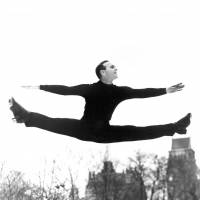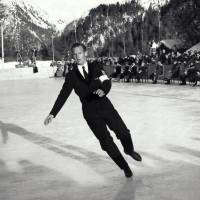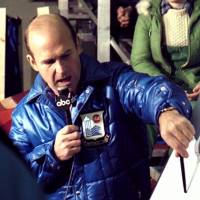One of the great aspects of being a sportswriter is the people the job puts you in contact with.
I have been blessed in my long career in sports media to work with, get to know or interview some of the all-time giants in different sports: Nadia Comaneci, John McEnroe, Michael Jordan, Ronnie Lott, Sadaharu Oh, Michael Johnson and many more.
It was another special treat recently to speak with Richard "Dick" Button via telephone for an interview ahead of the upcoming Pyeongchang Olympics.
Button is nothing short of a living legend in the sport of skating. The American's list of accomplishments is immense. Two-time Olympic champion (1948, 1952), five-time world champion (1948-52), the first man to land a triple jump (a loop) and a double axel, and inventor of the flying camel (which was originally known as the "Button camel").
The native of Englewood, New Jersey, was a member of the inaugural class of the World Figure Skating Hall of Fame in 1976. He was also the last man to win two consecutive Olympic gold medals when he accomplished the feat at the 1952 Games in Oslo. More than 65 years later nobody has been able to equal his achievement.
With reigning Olympic and world champion Yuzuru Hanyu in position to match Button with a second straight gold in South Korea in February, I wanted to get Button's advice for Hanyu in the coming months and his thoughts on the current state of skating.
Ice Time caught up with Button as he was supervising work in the garden of his home in North Salem, New York, one afternoon. Now 88, Button was sharp as a tack and as feisty as ever with his opinions.
Hanyu is going into the Olympics as the defending champion, just as Button was in 1952. So what general thoughts did he have for Hanyu?
"Not to overtrain," stated Button. "To relax and stay at the Olympic Village and have a ball."
Button could be on point, as Hanyu was nursing a knee injury during his recent appearance at the Autumn Classic International in Montreal, which limited him. Japanese athletes are known for their love and dedication to practice, sometimes to their detriment.
Button elaborated on his own Olympic experience and another that occurred years later in Japan.
"It's a very important setup," he said, looking back. "I did not stay in the Olympic Village in 1952. There was no Olympic Village in 1948 (in St. Moritz, Switzerland). It was just three years after the Second World War. We stayed in hotels. The Palace Hotel and the Kulm Hotel were pretty magnificent hotels to stay in.
Memories of Nagano
"When the Olympics were in Nagano (in 1998), Michelle Kwan stayed in the same hotel that I did with her coach and her parents," Button recalled. "Isn't that an exciting dinner partner? Doesn't that make you want to stand up and dance?
"Shep Goldberg (Kwan's agent), her parents and I were ancient. What the hell was she doing?"
Ice Time was in the White Ring that snowy February night when Kwan had the lead going into the free skate only to be overtaken by American compatriot Tara Lipinski. I told Button I remembered how tight Kwan appeared then.
"Yet little Tara Lipinski, who was 15, and had a ball playing ping pong with the 6-foot-4 athletes (in the Olympic Village) won the gold," Button noted.
Button, who was the first American to win both the Olympic and world titles, says obsession at the last minute isn't going to change anything.
"I urge all the skaters going into the 2018 Pyeongchang Olympics to relax," he said. "Stay in the village, have a ball. If you haven't learned it by now, you won't learn it in the next two days.
"My advice to all of these skaters, and Yuzuru Hanyu is only one of many great skaters, great athletes. The rules benefit them today. So relax and have a ball. You will remember having fun."
I asked Button, who was a TV commentator for ABC Sports for decades, if he felt more pressure going into his first Olympics in 1948 or second in 1952.
"I behaved differently," Button clearly recalled. "In '48 it was attacking, in '52 it was doing the best that I could. I will tell you one thing, in 1948 I skated the best I could. In 1952 I was a better skater, but I did not skate as well as I could have. Because I overtrained for it."
Amazingly, so many years later, Button is still unable to forget his shortcomings in Norway.
"I still remember, and it grates on me, the fact that I did not skate the best I could in 1952," he said with regret in his voice. "I made mistakes. I still won, but I made mistakes. Those grate and grind on me even today."
Did Button think 65 years later no man would have won the gold two times in a row since he did it?
"Records are made to be broken," he commented. "If it takes that long, it takes that long. Not to worry about it."
Button mentioned four skaters when speaking of the men's gold in Pyeongchang.
"Anybody can win this championship. It all depends on how they handle the pressure and how they skate," he said. "There is Javier Fernandez, there is Shoma Uno, there is Hanyu, there is the American (Nathan) Chen.
"Anyone can be good enough that day, or anyone can make a mistake. Unfortunately, and I use that word definitively, the rules are so oriented into quadruple jumps that it hurts."
Disdain for current rules
Though Button was reluctant to get overly specific about individual skaters, he didn't treat the International Skating Union with the same deference.
When questioned about Hanyu's total package as a skater, Button looked at the broader picture and his belief that the technical elements have overtaken creativity and robbed the sport of its essence in the process.
"The package for all of the skaters is right for the rules the way they are written," he stated. "Unfortunately, nobody follows the rules the way they were intended. The judges don't. Now the ISU is intending to change everything. As far as I'm concerned, I think they'll get it wrong.
"One factor is about the difference between the short program and the long program. The answer to that is two words — 2 minutes. Give me a break. The rules do not favor creative skating. One of the few skaters that achieves that is Javier Fernandez.
"But again, it will come down to the number of bloody quadruple jumps."
Button, who remains the youngest man (at 18) ever to win the Olympic gold, then turned the tables and asked me who were skaters I remembered.
"Peggy Fleming, Dorothy Hamill, Brian Boitano and Janet Lynn," I responded, while apologizing that I had not yet been born when he won his second Olympic gold.
"They are all American," he correctly replied. "Do you remember any skater that did 16 quadruples on the head of a pin?"
"No," I responded with a laugh.
"I remember people like the Protopopovs, John Curry, Toller Cranston," Button commented. "Yuna Kim was elegantly moving. She's South Korean."
Hanyu has been favorably compared to Curry, the 1976 Olympic champion who died tragically in 1994, by some observers.
When Curry passed away, Button issued a statement with the highest praise.
"John Curry was the finest and most intelligent all-around skater I've ever seen. He skated with a combination of superior athleticism, solid technique, classical line and musical sensitivity. And he was choreographically inventive."
Perspective on Mao
I asked Button what he thought of the recently retired three-time world champion Mao Asada.
"She was lovely," he said. "Mao Asada and Yuna Kim seemed to have a great sense of music and elegance, and unfortunately the rules have gone against their style of skating.
"You can't have technique without artistry, but neither can you have artistry without technique. Tell the ISU to stop trying to separate them."
What did Button think of Hanyu's epic free skate at the worlds in Helsinki last April?
"I think it was marvelous for the rules that exist now," Button said. "I don't like the rules that exist now. In my book, what is the matter with having something that is technically difficult and also creative?
"When you read a book that somebody writes, you don't want to have the sentences disrupt your reading, unless you're James Joyce. I am not in favor of a lopsided set of rules."
Creativity lacking today
Button says the repetition by skaters makes him nauseous.
"You can write an article that has sentences that are fine, but if it's boring it's no good," Button stated. "I can tell you the start of every skater's program. They will stand in the center of the ice and do a few arm movements, that try to signify what the music is.
"Then they will skate in a huge circle around the end of the rink and do the most difficult jump that they possibly can. A quadruple something or other combination, and God knows what. Every skater does exactly the same thing.
"To be honest with you, I don't watch too much of the skating anymore. I can't stand it."
When I pushed Button on this, the man who graduated from Harvard and then earned a degree from Harvard Law School, crystallized his feelings.
"I get bored. Everybody is the same," he said. "I just don't find it interesting. And obviously the ISU doesn't either. They'll muck it up. Spew around the gold medals. They already do. Everybody is a gold medalist because some team wins the gold medal. Now everybody is a gold medalist. Add some more in, why not?"
Skating's historic cycles
Button, who toured with the Ice Capades and Holiday on Ice following his amateur career, cited the cyclical nature of the sport through the years.
"There are different cycles in skating. First there were Americans after the Second World War. Myself, Hayes Jenkins, Tenley Albright, Carol Heiss, Ronnie Robertson, etc."
"Then the Russians — the Protopopovs, Irina Rodnina, Alexander Zaitsev, etc. Now the Asians — Japanese and Korean . . . Yuzuru, Mao, Yuna, Uno, etc. The odd one out is the Spaniard Javier Fernandez, who is one of the few to be both quad-oriented, original and artistic.
"The American cycle right now, is for the (national champions Nathan and Karen) Chens, who actually are of Asian descent."
Did Button ever think he would see the day that Japanese skaters would be this strong?
"Of course," he remarked. "The rules favor slender bodies. Brian Boitano (the 1988 Olympic champion) nor I could possibly do anything under the rules today. I couldn't have done a quadruple if my life had depended upon it."
One of the few roles Button has not filled in skating is that of coach. Ice Time wondered if he had ever considered taking on that task.
"I don't have the ability to be a coach," he stated firmly. "I don't have the temperament. I would kill them."
Button listed some of the coaches he admires, after I asked him to.
"There are many coaches that I think are wonderful," he commented. "Brian Orser, Frank Carroll, Gustave Lussi (who was Button's coach), Tracy Wilson. The list goes on and on."
What advice would Button give to a young person wanting to go into skating today with aspirations of making the Olympics?
"Have your parents mortgage their house and spend the biggest and longest warm weather vacation that you possibly can," he said with a cackle. "Because a skier only has to get down there fastest. A tennis player can sometimes face the fact of a bad call. The golfer either gets the ball in the hole or doesn't. Don't try to make a silk purse out of a sow's ear."
Button harkened back to his days as a promoter for a solution to the current emphasis on technique over artistry in skating.
"The World Professional Figure Skating Championships that I started (in 1973) had two programs," he cited. "One had the emphasis on artistry and the other one had the emphasis on technique. That's what I recommend for the ISU to correct this."
The ISU is considering this very idea, according to a recent report by legendary skating writer Phil Hersh.
I wondered if Button missed traveling the world and commentating on skating after doing it for so long.
"No. Because I don't like watching what I'm seeing," Button stated. "The ISU is always meddling with the rules.
"They get the world's most iconic, most popular, most talked about program like (Jayne) Torvill and (Christopher) Dean's "Bolero" (at the 1984 Sarajevo Olympics) and they immediately change all the rules, preventing everything that made it interesting.
"If Torvill and Dean had gone into the next Olympics, or even the next year, they would have been kicked out. They wouldn't have even made the finals."





